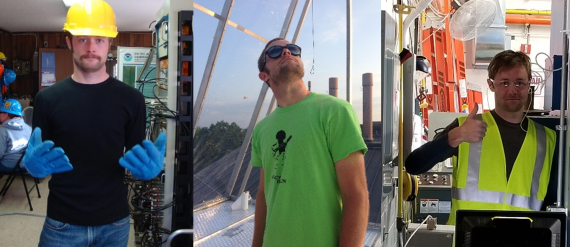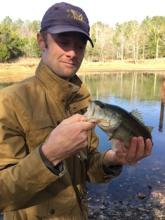By Joel Thornton, Jason Surratt, John Offenberg, and Jinny Riedel
We are deeply saddened to share that Theran Riedel, Ph.D. '13 passed away on March 12, 2021, after a two-year battle with cancer. He was 37 years old. We hope to convey the gratitude and appreciation we feel to have been able to work with Theran through his professional career, during which, although unfairly short, he made substantial impacts in the field of atmospheric chemistry. Theran made his scientific achievements with an ever-present positive attitude, quiet but ferocious determination, curiosity, and dedication to excellence. Moreover, Theran was the consummate team player, committing himself to making important contributions to the project as a whole and not just his own piece, always with great humility and humor.
After graduating with a B.S. in Chemistry from the University of Wisconsin, Eau Claire, Theran joined the Chemistry graduate program at the University of Washington (UW) in the fall of 2007, where his intention was to pursue a Ph.D. in physical chemistry. Upon taking a course taught by Professor Joel Thornton, his eventual Ph.D. adviser on atmospheric chemistry, Theran saw a way to connect his passion for the environment with his scientific and engineering skills. Theran went on to advance new methods for measuring reactive halogens in the atmosphere, studying the chemical reactions of trace gases with airborne particulate matter, and conducting computer modeling to assess their importance to local and regional air quality. Theran had a special talent for making a complex instrument or experimental apparatus work. He deployed custom-built mass spectrometers aboard research vessels spending weeks on the Pacific Ocean, or traveling up and down a 300 m (1000 ft.) tall tower on an elevator, with the instrument operating continuously unattended even in sub-freezing conditions. His Ph.D. thesis, “Constraints on the Reactivity and Components of Nocturnal Nitrogen Oxides,” laid a foundation for determining the impact of nighttime atmospheric chemistry on air quality specifically through the liberation of reactive halogen compounds from particulate matter in polluted regions. This work propelled subsequent studies of the importance of interactions between marine air and coastal urban pollution in affecting the production and processing of photochemical smog – an area which continues to be actively researched. By the time he received his Ph.D. in 2013, Theran was an author or co-author on 15 publications which have in total more than 1500 citations to date. His network of peers and fellow scientists runs deep as a result, and we have been heartened by the outpouring of sympathies from those he worked with during his time at the UW.
After completing his Ph.D. work at the UW, Theran joined Professor Jason Surratt’s research group as a postdoctoral scholar at the University of North Carolina in Chapel Hill (UNC). Before even officially joining Professor Surratt’s lab in the fall of 2013, Theran volunteered to visit the UNC group in the field at the Look Rock Mountain, TN, ground site during the 2013 Southern Oxidant and Aerosol Study (SOAS). During his visit at Look Rock, the UNC team vividly recalls Theran being especially critical in helping the research group appropriately setup their chemical ionization mass spectrometer (CIMS) for the real-time detection of gas-phase isoprene-derived oxidation products that are key to airborne fine particulate matter formation. Following the SOAS campaign in the summer of 2013, Theran officially joined the UNC group to work on research projects funded by the U.S. EPA and NSF to increase our fundamental understanding of the airborne fine particulate matter formation that occurs from the multiphase chemistry of isoprene-derived epoxides. Theran’s expertise in CIMS and multiphase chemical studies of NOx reservoir species he developed at the UW greatly helped the UNC group to systematically resolve how relative humidity, aerosol acidity, and pre-existing aerosol composition affect the explicit multiphase chemistry of isoprene-derived epoxides leading to fine particulate matter formation. This work led to Theran being either the lead author or co-author on 5 publications resulting between ongoing collaborations between UNC and UW, which have in total more than 450 citations to date. Theran’s work on the multiphase chemistry of isoprene-derived epoxides substantially aided in the improvement of parameterizations used to explicitly predict airborne fine particulate matter formation from isoprene oxidation in atmospheric chemistry and air quality models. Professor Surratt strongly credits Theran’s research and personal contributions to his lab as being one the major reasons he was granted tenure at UNC. Furthermore, Theran served as a direct mentor to many of Professor Surratt’s students, helping others successfully obtain their M.S. or Ph.D. degrees. Theran was not only a close research colleague and mentor, but also a dear friend to our group beyond his time at UNC. Current and past Surratt group members are deeply saddened by the loss of Theran.

Theran Riedel always in action, during his Ph.D. (left), as a Postdoctoral Fellow (center), and as a Research Scientist at the U.S. EPA’s Center for Environmental Measurement and Modeling.
After UNC, Theran joined the experimental atmospheric chemistry group within the US EPA’s Office of Research and Development under the supervision of Dr. John Offenberg at the Center for Environmental Measurement and Modeling. During his five years with the Agency, he applied advances learned and developed early in his career to the problems of how to better understand and manage particulate pollution in the atmosphere, through laboratory and field experiments. Further, he collaboratively developed and applied techniques to identify and evaluate the gas phase compounds related to carcinogenesis resulting from atmospheric oxidation of volatile organic gases. Later, he gracefully shifted to apply his skills to the identification of novel, highly fluorinated compounds in emissions to air, and to evaluate the potential for chemical destruction of those compounds to help minimize release to the environment. Theran assiduously applied himself to ongoing laboratory work, finding solace and purpose in scientific progress throughout his battle with cancer. He kept much of his struggle with cancer private, yet continued in his personal joy-filled channels, ultimate frisbee and fly fishing, as best he could. In the laboratory, he continued to support others in their work, and to publish the results, all of which he chose to shoulder industriously until the last weeks of his life. He expressed gratitude in being able to find purpose through his work during his struggle for his own life. Theran will be greatly missed by the many who were touched by his humble and generous approach to work and life.
If you would like to share memories of Theran, please contact Diana Knight so we can forward your reflections to or connect you directly with Theran's wife, Jinny Riedel.
P.S. Next time you go fly fishing (catch and release), file the barbs off your hooks; it is kinder to the fish and Theran would thank you.
